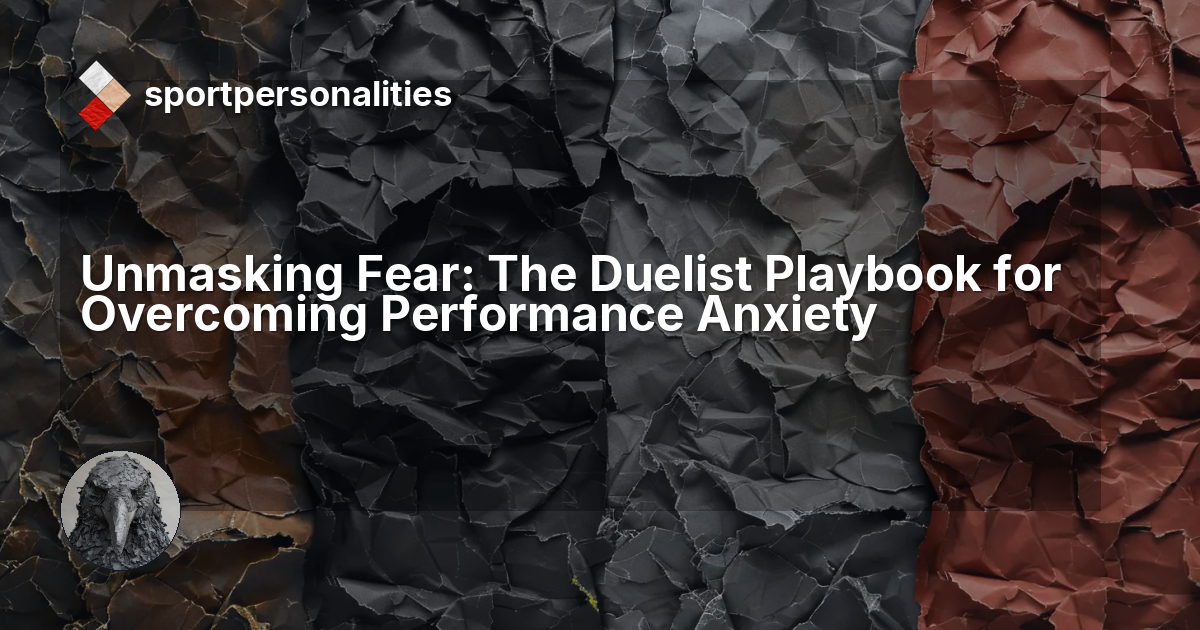The chess grandmaster sits motionless for seventeen minutes, studying the board. Their opponent shifts restlessly, checks the clock, drums fingers on the table. But the grandmaster sees something others miss: three moves ahead, a trap is forming. When they finally move their knight, it appears simple. Twenty-three moves later, checkmate.
You'll find this same calculating approach in  The Duelist (IOTA), a psychological type that's both fascinating and vulnerable. The irony? The very mental precision that makes them dominant can also become their greatest source of performance anxiety.
The Duelist (IOTA), a psychological type that's both fascinating and vulnerable. The irony? The very mental precision that makes them dominant can also become their greatest source of performance anxiety.
The Duelist's Relationship with Fear
Most athletes fear failure. The Duelist fears something more specific and potentially paralyzing: being outthought. Their anxiety doesn't stem from physical inadequacy or lack of preparation. It comes from the terrifying possibility that their analysis was incomplete, their strategy flawed, their mental edge compromised.
Picture a tennis player who has spent weeks studying an opponent's serve patterns, return tendencies, and court positioning. They've mapped out seventeen different tactical scenarios. But as they walk onto court, a single thought creeps in: "What if there's an eighteenth scenario I missed?" That thought can spiral into performance-crushing anxiety in seconds.
The Duelist's anxiety operates on multiple levels. Surface level, they worry about execution. Deeper down, they fear their preparation was insufficient. But at the core, they're terrified of being exposed as intellectually inferior to their opponent. For someone who views sport as mental warfare, this cuts to their very identity.
The Overthinking Trap
Consider a golfer standing over a crucial putt. Most players might think about line and speed. The Duelist is calculating wind micro-patterns, green moisture levels from morning dew, and how their opponent's previous putts revealed subtle breaks they hadn't noticed in practice rounds. They've turned a four-foot putt into a physics equation.
This works great until something unexpected happens. The Duelist thrives on patterns and predictability. But sport, by nature, contains random elements. A bad bounce, an unexpected tactical shift, or an opponent playing outside their usual patterns can send The Duelist into mental overdrive.
The result is analysis paralysis. They stand frozen, not by fear of missing, but by the overwhelming need to process every possible variable. What made them great now holds them back.
The Isolation Cycle
When anxiety strikes, The Duelist's natural response is withdrawal. They retreat into their own analytical world, convinced that deeper study will solve their mental struggles. A basketball player might spend hours alone watching game film, searching for the tactical insight that will restore their confidence.
This backfires. Without external perspective, their worries compound. They begin seeing patterns that don't exist, overcomplicating simple situations, and losing touch with the intuitive feel that balanced analysis requires. The more they analyze their anxiety, the stronger it becomes.
Their resistance to outside input makes this worse. Coaches and teammates offer support, but The Duelist filters everything through their analytical lens. "Just play your game" sounds meaningless to someone who views their game as a complex strategic system. "Don't overthink it" feels like asking them to abandon their core identity.
Strategic Anxiety Management
The key to helping The Duelist overcome performance anxiety isn't eliminating their analytical nature. It's channeling it more effectively. Their approach to managing anxiety must be as systematic as their approach to competition.
First, they need preparation protocols that include uncertainty training. Instead of just studying what their opponent typically does, they should prepare for what happens when opponents deviate from patterns. A swimmer might practice race scenarios where their stroke count gets disrupted, or their usual pacing strategy fails. By rehearsing adaptability, they reduce the anxiety that comes from unexpected situations.
Second, The Duelist benefits from time-boxed analysis. Give them thirty minutes to study an opponent, then stop. More information won't reduce their anxiety; it will increase it. They need to learn that perfect analysis is impossible, and good enough analysis combined with superior execution beats perfect analysis paralysis.
Third, they need pre-performance routines that shift them from analytical mode to execution mode. A hockey player might spend the week studying opponents, but the hour before the game should focus on physical preparation and mental clearing. They need a mental switch that says "analysis time is over, performance time begins."
Reframing the Mental Game
The most effective anxiety intervention for The Duelist involves reframing their relationship with uncertainty. Instead of viewing unknown variables as threats to their preparation, they can learn to see them as opportunities for in-game adaptation.
A volleyball player facing an opponent with an unusual serving style shouldn't panic about incomplete preparation. They should get excited about solving a tactical puzzle in real time. This mindset shift turns worry-inducing unknowns into exciting puzzles to solve.
The Duelist also needs to understand that their opponents are dealing with the same uncertainties. While they're worried about incomplete analysis, their opponent might be struggling with nerves, physical preparation, or their own tactical concerns. The playing field is more level than their anxious mind suggests.
Building Execution Confidence
The Duelist's anxiety often stems from over-relying on mental preparation while under-trusting their physical and instinctive abilities. They've spent so much time in their heads that they've lost connection with their body's intelligence.
A soccer player might have perfect tactical awareness but doubt their ability to execute under pressure. They need training that builds confidence in their physical skills independent of their mental analysis. Small-sided games, reaction drills, and improvisation exercises help them trust their instincts.
They also need to experience success in unscripted situations. Scrimmages where they can't prepare, pickup games with unfamiliar players, or modified rules that require adaptation all help build confidence in their ability to perform without perfect preparation.
The Competitive Advantage
Once Duelists crack this code, they're dangerous competitors. Their analytical abilities remain intact, but they're no longer paralyzed by uncertainty. They can prepare thoroughly without over-preparing, analyze deeply without overthinking, and adapt quickly when situations change.
The mental skills that help them overcome anxiety also make them better competitors. Learning to perform with incomplete information, trust their instincts, and adapt in real time adds new dimensions to their tactical arsenal.
Most importantly, they discover that their greatest fear was largely imaginary. Being outthought occasionally doesn't diminish their identity as strategic thinkers. It simply provides new data for future preparation. The anxiety that once felt overwhelming becomes just another variable to manage in their systematic approach to excellence.
The Duelist's journey through performance anxiety isn't about changing who they are. It's about becoming a more complete version of themselves, one who can think deeply and perform freely, who can analyze precisely and execute instinctively. When they achieve that balance, they don't just overcome their fears. They transform them into competitive advantages.
Frequently Asked Questions about The Duelist
How does The Duelist's intrinsic motivation affect their approach to performance anxiety?
The Duelist's intrinsic  Drive means their anxiety isn't about external validation but about maintaining their internal standards of tactical excellence. They fear being intellectually inferior to opponents, which cuts to their core identity as strategic thinkers rather than just disappointing others.
Drive means their anxiety isn't about external validation but about maintaining their internal standards of tactical excellence. They fear being intellectually inferior to opponents, which cuts to their core identity as strategic thinkers rather than just disappointing others.
Why does an IOTA type struggle with performance anxiety due to their other-referenced  Competitive Style?
Competitive Style?
The Duelist's other-referenced nature means they're constantly measuring themselves against specific opponents. This creates anxiety when they can't fully analyze or predict their opponent's tactics, leading to fear of being outthought in direct competition.
What mental strategies work best for IOTA athletes given their tactical approach and autonomous style?
The Duelist benefits from time-boxed analysis sessions, uncertainty training scenarios, and pre-performance routines that shift from analytical to execution mode. Their autonomous nature means they need self-directed strategies rather than external coaching during competition.
How can The Duelist's tactical mindset be used to systematically overcome anxiety?
The Duelist should treat anxiety management like any other strategic challenge - with systematic preparation protocols, uncertainty training, and reframing unknown variables as tactical puzzles to solve rather than threats to their preparation.
Why do traditional anxiety management techniques often fail with IOTA athletes?
Generic advice like 'don't overthink it' conflicts with The Duelist's core identity as a tactical analyst. Their autonomous nature and intrinsic motivation require specialized approaches that channel rather than suppress their analytical tendencies.
How does The Duelist's fear of incomplete analysis create a cycle of increasing anxiety?
Their tactical approach drives them to seek perfect preparation, but when uncertainty arises, they retreat into isolation for more analysis. This autonomous response actually feeds the anxiety, creating analysis paralysis instead of confident execution.
This content is for educational purposes, drawing on sport psychology research and professional experience. I hold an M.A. in Social Psychology, an ISSA Elite Trainer and Nutrition certification, and completed professional training in Sport Psychology for Athlete Development through the Barcelona Innovation Hub. I am not a licensed clinical psychologist or medical doctor. Individual results may vary. For clinical or medical concerns, please consult a licensed healthcare professional.





